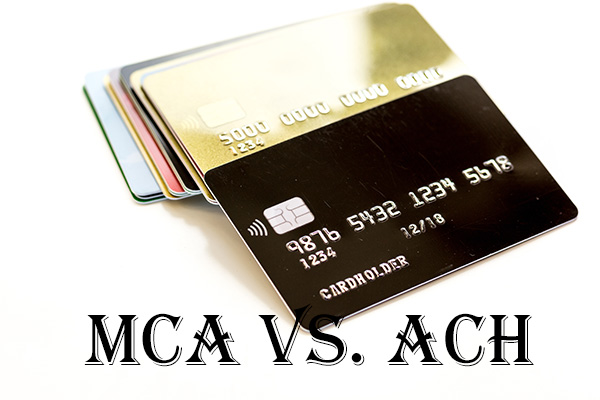
Quick Look: MCA vs ACH
While both Merchant Cash Advances and ACH (Automated Clearing House) Loans offer financing to businesses with less-than-perfect credit or a need for quick capital, they differ in terms of repayment structure, cost calculation, and flexibility. ACH loans are more similar to traditional term loans with fixed repayments, while MCAs are characterized by flexible repayments based on daily credit card sales or fixed daily/weekly amounts. It’s crucial for businesses to carefully consider the terms, costs, and implications of each option before deciding which financing method is most suitable for their needs.
Quick Look: MCA vs ACH
Merchant Cash Advance (MCA) and ACH (Automated Clearing House) loans are both alternative financing options for businesses, but they have distinct differences in terms of structure, repayment, and risk. Here’s a brief overview of each:
Merchant Cash Advance (MCA):
- Repayment Structure: With an MCA, the lender provides a lump sum amount to the business in exchange for a percentage of the daily credit card sales or a fixed daily or weekly amount from the business bank account.
- Repayment Method: Repayments are typically collected automatically through the credit card sales or ACH debits from the business bank account.
- Cost: Instead of an interest rate, MCAs use a factor rate, which is a multiplier applied to the advance amount. The total repayment amount is the advance amount multiplied by the factor rate.
- Flexibility: MCAs may have a higher cost of capital compared to traditional loans, but they offer flexibility in repayment, as the amount paid is tied to the business’s daily sales.
Automated Clearing House (ACH) Loan:
- Repayment Structure: ACH loans are term loans where the borrower receives a lump sum upfront and repays the loan through fixed daily or weekly ACH debits from their business bank account.
- Repayment Method: Similar to MCAs, ACH loans are repaid through automated withdrawals from the business’s bank account, but the withdrawals are fixed and not tied to daily credit card sales.
- Cost: ACH loans typically have an interest rate, and the total cost of the loan is determined by the interest rate applied to the outstanding balance over the loan term.
- Terms: ACH loans often have fixed terms and regular repayment schedules, providing a more predictable repayment structure compared to MCAs.
So while both Merchant Cash Advances and ACH Loans offer financing to businesses with less-than-perfect credit or a need for quick capital, they differ in terms of repayment structure, cost calculation, and flexibility. ACH loans are more similar to traditional term loans with fixed repayments, while MCAs are characterized by flexible repayments based on daily credit card sales or fixed daily/weekly amounts. If dealing with a B2B client, it’s important for businesses to carefully consider factoring for the business due to the easier terms, lower costs, and implications of each option before deciding which financing method is most suitable for your client’s needs.
